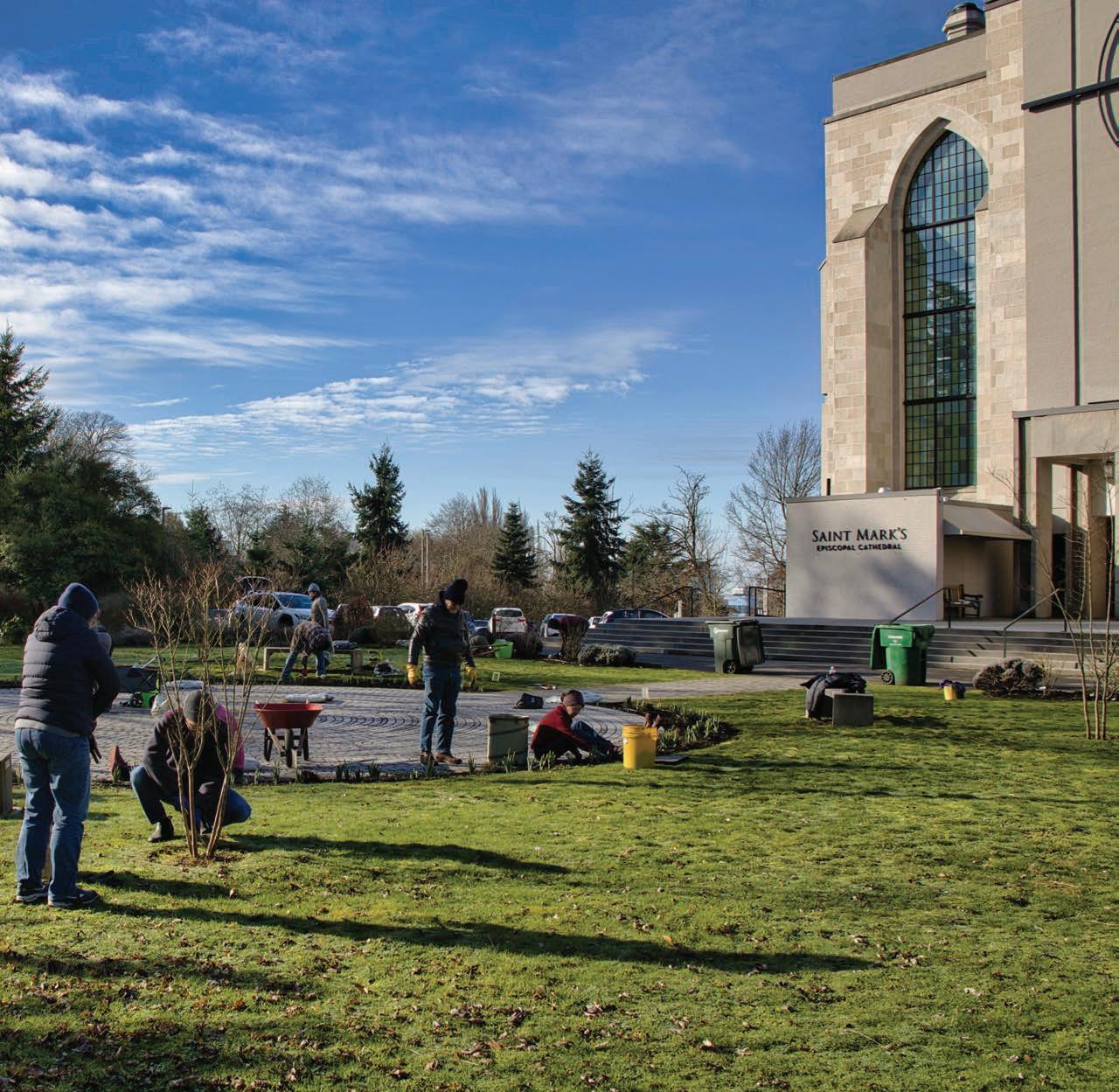




welcome inspire transform serve
Wherever you are on your spiritual journey, you are welcome here.
THE VERY REV. STEVEN L. THOMASON Dean & Rector MARIA COLDWELL Editor GREGORY BLOCH Design & Layout KEVIN JOHNSON PhotographyThe Rubric is a publication of Saint Mark’s Cathedral, Seattle, which celebrates who we are as a community—as a parish, as a cathedral for the Diocese of Olympia, as Episcopalians, and as Christians.
The Rubric received the Award of Excellence for “Best print publication— parish or cathedral” at the Polly Bond Awards for Excellence in Church Communications, awarded at the 2023 conference of Episcopal Communicators.
on the cover: A Saturday work party of the cathedral’s Garden Ministry. Photo by Kevin Johnson.
opposite page: The Burning of the Greens following the Twelfth Night Celebration and Eucharist, January 5, 2024. Photo by Michael Perera.
All photos by Kevin Johnson, Gregory Bloch, Michael Perera, or livestream stills, except: p. 6, lower right by Mark Wilson; p. 9 by Christopher Breunig; p. 14 by Brian Smale; p. 15 courtesy of Lambert House
“something old, something new, something borrowed, something blue…”
Isuspect we all know this idiom of matrimonial wisdom and its playful charge as two people begin their new life together. As odd as it might sound, I have found the saying applicable to the life of the congregation as it turns into a new era, as this cathedral community is even now. A new strategic plan, new spiritual offerings, new ways of seeing realities of justice, and yet always with this sense of deep rootedness in the past, in the particulars of this place and in connection with those who span the generations here. A community of faith necessarily holds both, old and new, as we embark on the path forward. It is a measure of vitality that intermingles time-tested ways and the newfangled ways that courageous hope emboldens us to engage.
Contours of the Christian Life, for example, is a locally adapted approach to the ancient practice of preparation for those new to the faith, historically known as the catechumenate (Greek: teaching), but open to anyone seeking to deepen their faith. Something old, something new…
A new strategic plan to guide us in this post-pandemic era was recently adopted by the cathedral Vestry. The process employed an old model, tried and true, to see new ways of transformation taking shape in our common life. It will serve the community well.
Themes of justice are prevalent in this issue of The Rubric, as is often the case for a cathedral community that has a deep-seated devotion to the work. Herein you will find new ways of engaging this important work described
along with the invitation to become involved. Restorative Justice Council, Sacred Ground, hosting Lambert House, Mideast peace, and exploring affordable housing on campus are all “new” ways of being about this work, but always grounded in the ancient wisdom that the Rev. Jennifer King Daugherty so eloquently shares—that our work of justice is spiritual practice grounded in the Gospel. Themes of stewardship in this issue— literally, seeing that we are entrusted with resources and gifts for the benefit of others—invite us to reflect on all that we’ve been given in this life, and how we share those gifts in gratitude and joy. An article on legacy giving draws us close to those who have gone before and those who will come after us in this place. And we publish the names of all who have given to the mission and ministry of Saint Mark’s Cathedral in the past year as a way of giving thanks for the broad and generous base that forms this wonderful community. Thank you!
There is a sense that our work is always unfinished, like the cathedral in which we worship. Jesus said the poor will always be with us, which I take to mean our work of justice and peace and reconciliation will never be wholly fulfilled. If that brings us up short, then we can grieve it, and we can be blue, but always with this clarion call to press on in courageous hope that God is stirring in the midst. That is my take-away from this issue, that there is a lot of good work afoot, and a vitality to this community, but it is all inspired by and enthused by God’s Spirit working in and among us. And for that I am exceedingly grateful.

The Very Rev. Steven L. Thomason Dean & Rector
episcopal cathedral✴ indicates livestreamed service
sundays
8 a.m.
The Holy Eucharist
9 a.m.
The Holy Eucharist
11 a.m.
✴The Holy Eucharist
4:30 p.m.
✴ Choral Evensong (first Sunday of the month, October–June)
7 p.m.
Contemplative Eucharist
9:30 p.m.
✴ The Office of Compline broadcast on king 98.1 fm, and livestreamed at saintmarks.org and on Facebook & Youtube
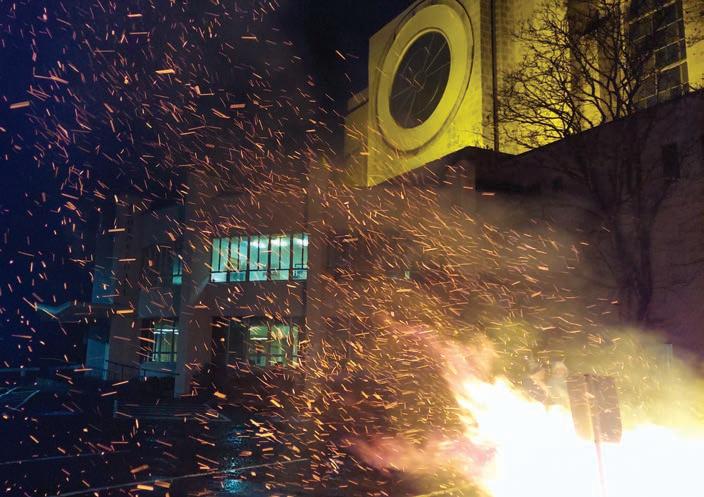
weekdays
monday–friday, 6 p.m.
Evening Prayer online via Zoom
monday, 6:30 p.m.
Cathedral Yoga in person in the cathedral nave
tuesday, 7 p.m.
Contemplative Prayer in person in the cathedral nave (A ✴Taizé Service replaces Contemplative Prayer on March 19 & May 21)
wednesday, 6 p.m.
Cathedral Commons in-person community supper followed by a forum or presentation, usually also available online via Zoom
thursday, 7 a.m.
1st/3rd/5th Thursdays:
The Holy Eucharist in person in Thomsen Chapel
2nd/4th Thursdays:
Morning Prayer via Zoom only
4
14
5
6
7
9
19
10
11
19
20

The resignation of a diocesan bishop sets into motion a wide-ranging project to search for, elect, consecrate and install the next bishop, all guided by highly detailed and sometimes clunky canonical provisions. When Bishop Greg Rickel announced his resignation mid-2022, those wheels started to turn, slowly at first and now with more speed, as the sequential vision unfolds from here.
The search for the next bishop began in earnest in May 2023 and was necessarily a confidential process to ensure candidates can discern with us while continuing in their current positions in the Church. As one who was named to the Bishop’s Search Committee, I can attest to the integrity of the process, the commitment of committee members who have devoted great swaths of time to the cause, and a prayerful faithfulness for all involved. I bid your prayers, too. Cathedral Sacristan and Head Verger Michael Seewer has been named to the Transition Committee, which is charged with guiding the process
after the slate of candidates for our next bishop are named. Saint Mark’s Cathedral will play host to several key events along the way.
During the week of April 29, 2024, there will be regional “Meet-andGreets” across the diocese—opportunities for all Episcopalians in Western Washington to engage with the candidates under consideration to be our next bishop. Saint Mark’s Cathedral has been asked to host one of these engagements, the exact date to be announced in the coming weeks.
On Saturday, May 18, 2024, the cathedral will serve as host for the Electing Convention in which all the canonically resident clergy, along with delegates from all congregations in good standing in the diocese, will select our next bishop. To be elected, one must obtain a majority of votes in both orders—lay and clergy—on the same ballot. It sometimes takes several ballots for that to come about. This convention will be chaired by Bishop Provisional Melissa Skelton who is serving as interim until the new bishop takes office. (The election must also receive consents from a majority
of other dioceses in the 90 days that follow.)
On Saturday, September 14, 2024, the newly elected bishop will be consecrated at a special service planned for Meydenbauer Center in Bellevue, to accommodate the large assembly who will gather. It will be a grand service of worship and marks a major moment of transition in the life of a diocese.
On Sunday, September 15, 2024, at a special service of Choral Evensong at Saint Mark’s Cathedral, the new bishop will be “seated” in their cathedral, an ancient and ceremonial tradition symbolizing the cathedral’s role in the life of the bishop and their diocese.
After a weekend of liturgical celebration observing the start of a new era, the bishop begins their work of ministry among us in earnest. This person is already known to God; may we be faithful in prayer as we discern together who will be called to serve as our next bishop. ◆


The Rev. Jennifer King Daugherty resigned her position at Saint Mark’s Cathedral in January. In her nine-and-ahalf years at Saint Mark’s, first as a curate then as canon, Jennifer touched many lives, and we are all grateful for the gifts she shared with this community. Her last day at Saint Mark’s was Sunday, January 28, 2024, when we celebrated her ministry. Jennifer said in her note to the congregation “I am deeply grateful for the opportunity to serve the Saint Mark’s community as priest and pastor for almost ten years. I have loved being in ministry with you, with Dean Thomason, and with the dedicated clergy and cathedral staff. I am inspired by the community’s faithfulness and creativity and see the Holy Spirit at work, always making things new. I trust the Holy Spirit is guiding me, too, and as I discern my next chapter of ministry, I look forward to delving deeper into Celtic Christianity and prayer practices. Please know my love and prayers for you continue.”
The Rev. Linzi Stahlecker Named Cathedral Canon
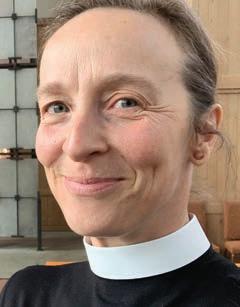
As announced last fall, upon completion of her curacy training on January 15, the Rev. Linzi Stahlecker has assumed the role of Cathedral Canon. She will continue preaching, teaching, and offering pastoral care and ministry group support, while a few aspects of her responsibilities will shift in the coming weeks.
The Rev. Rich Weyls joined the cathedral clergy team in February as Canon and Associate to the Rector. He is no stranger to Saint Mark’s, having served as an assisting priest here from 2013–2017, and marrying his husband Mark in a liturgy in Thomsen Chapel in August of 2017. He then served as Rector of St. Andrew’s Green Lake and, most recently, as Interim Manager of Spiritual Care for five Providence Swedish hospitals in the Seattle region. His first day on staff was Sunday, February 18, when he offered a sermon at morning services (pictured below).
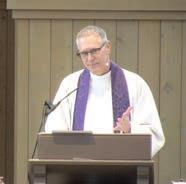

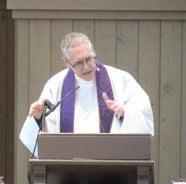
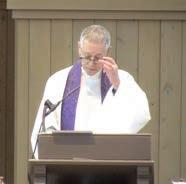






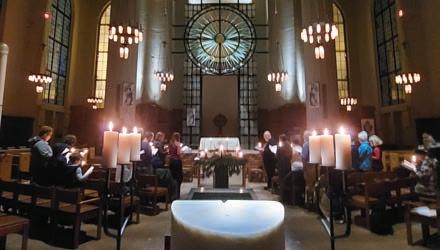


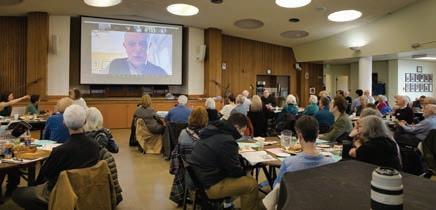

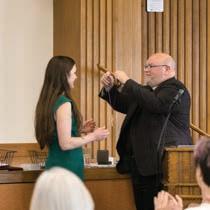



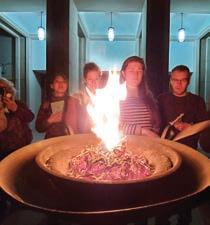
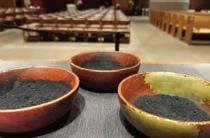


new, updated Strategic Plan for the Saint Mark’s Cathedral Parish community was adopted by the Vestry on February 10, 2024. It focuses on six key themes:
1. Being Rooted in Spiritual Practices
2. Empowering the Call to Action and Service
3. Cultivating Diverse Community
4. Stewarding Our Resources
5. Expanding Regional Reach and Welcome
6. Connecting and Telling Our Stories
Each of these themes is designed with recommendations and guidance to empower ministries to take part in bringing the plan to life.
Guided by the Vestry, the Strategic Planning Committee launched its work in July 2023 with Emily Meeks and Alexandra Thompson serving as co-chairs. The Committee’s charge was to develop a plan that focused on the next 18–24 months.
“When the Vestry began its organizing work, it was clear that there continued to be passion for the three big

Mutual Ministry Goals of Creation Care and Carbon Reduction, Intergenerational and Innovative Community, and Restorative Justice and Systemic Change,” said Scott Hulet, Senior Warden in 2023. “However, it also became clear that the rapidly changing social, political, and personal landscape in our post-pandemic world brought new variables, opportunities, and challenges. The Vestry discerned that it was time to ask and to listen: Where is the Spirit calling us? How do we strategically do the work of ministry in today’s rapidly changing world?”
The Committee first reviewed the 2020 Strategic Plan (released just before covid) to reflect on what could be celebrated, what might be ending, and what could have the potential for transformation if adapted.
Central to the approach was exploring “transformation” as a way of discerning where God is leading this
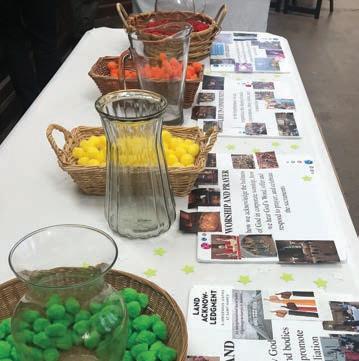

community in a post-pandemic world. Transform has long been one of the guiding principles of Saint Mark’s— we seek to be transformed by love and to share this love generously with others.
The Committee adapted a model from the College of Congregational Development called “Sources of Transformation,” grouping congregational life into four means of transformation—worship and prayer, formation and justice, stewardship and life in community.
◆ Worship & Prayer : how we acknowledge the holiness of God in corporate worship, how we hear God’s Word, offer and respond to prayer, engage in music, and celebrate the sacraments.
◆ Formation & Justice: how we come to know God through our mind, heart, and bodies and respond in ways that promote peace, love, reconciliation, and restoration.
we espouse, as individuals and as a community of faith, affords a rich opportunity for transformation, just as we are transformed by God’s love and the love we share with each other and the world. It seems right and good to build a strategic plan on such a foundation.”
Committee members formed into “Transformation Groups” (Worship & Prayer, Formation & Justice, Stewardship, and Life in Community) to interview ministry groups listed in the 2023 Ministry Guide. Additionally, an All-Parish Survey was conducted in November with engagement activities throughout the process to focus on transformation in community. The themes that emerged appeared in each of the data sets collected.
“DEVELOPING A STRATEGIC PLAN GUIDED BY THE VALUES WE ESPOUSE, AS INDIVIDUALS AND AS A COMMUNITY OF FAITH, AFFORDS A RICH OPPORTUNITY FOR TRANSFORMATION...”
—Dean Steve Thomason
◆ Stewardship: how we give and share our time and resources, how we care for our campus and buildings, and how we care for Earth.
2023 Strategic Planning Committee members:
Seyi Akanni
Canon Wendy Claire Barrie
Elli Howard
Scott Hulet
Canon Michael
Kleinschmidt
Julia Logan
Kathy Minsch
Emily Meeks (Co-Chair)
Michael Perera
Canon Linzi Stahlecker
Dean Steve Thomason
Alexandra Thompson (CoChair)
Doug Thorpe
◆ Life in Community: how we experience the sharing of meals, conversation, story, silence, and connection.
“Some organizations center strategic planning around increased revenue, improved efficiencies, or growth and expansion— entrepreneurial lenses of success,” said Dean Steve Thomason. “Churches are different, and our values guide us to orient to faithfulness rather than ‘success’ (however that might be defined for a church). Developing a strategic plan guided by the values
Following adoption of the plan, the Vestry, staff, and ministry groups will devote intentional time to integrating the Strategic Plan into meetings and work. The Committee will provide each ministry group a copy of the strategic plan, a resource guide, and notes from their ministry outreach.
And while the plan is completed, the work of transformation continues. Where are you experiencing transformation on your spiritual journey? And how is Saint Mark’s facilitating growth? These are the ongoing questions that will continue to help each of us to grow in community together.
“This is a grassroots, living document that will serve this community well,” said Thomason. “This collective work is integral to the ways we envision the cathedral serving as a house of prayer, a beacon of hope, and a sacred community engaged in justice and peace in a post-pandemic world.” ◆
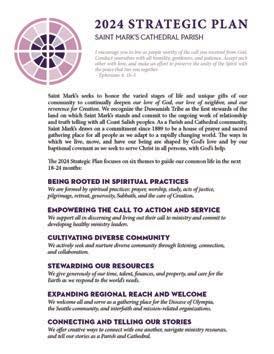
Learn more and read the full 2024 Strategic Plan document at: saintmarks.org/strategicplanning
ustice has always been at the core of Saint Mark’s Cathedral’s mission. The Episcopal Baptismal Covenant focuses our journey as we promise with God’s help to “seek and serve Christ in all persons,” and to “strive for justice and peace among all people, and respect the dignity of every human being.” Also, a recently endorsed addition to the Baptismal Covenant commits us to “cherish the wondrous works of God, and protect the beauty and integrity of all creation.” Our faithful actions to fulfill these promises are the essence of our identity as a community of Christians who actively strive for justice.
On September 9, 2023, over sixty Saint Mark’s parishioners gathered for a day-long retreat called by the Restorative Justice Council to re-vision our justice ministries. We came together with deep gratitude for the long history of striving for justice at Saint Mark’s. We also came with the desire to further integrate our Statement of Lament and Commitment to Action 1 into our ministries.
As we began, Dean Steve Thomason challenged us with this definition which clarified our calling: “Restorative justice is an approach to justice work that seeks to repair harm by providing an opportunity for those harmed, and those who take respon-
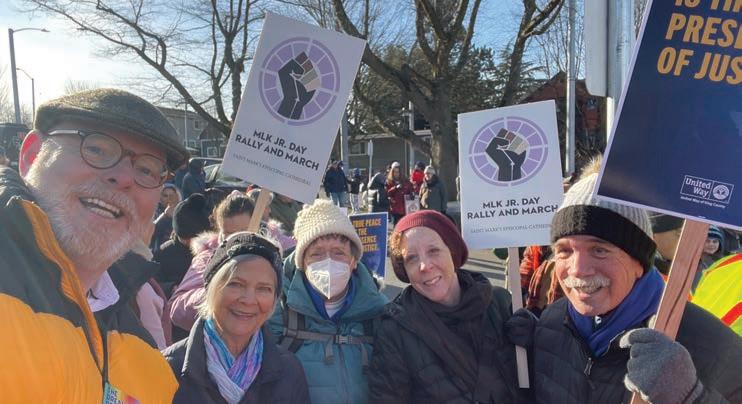
sibility for the harm, to communicate about and address their needs in light of the injustice.”
There was resonance with this vision among those of us gathered. It brought the work of justice into our personal awareness; that our merciful God loves us and is with us in relationship is at the heart of why we are called to love others. Hurt needs to be spoken and heard before it can be healed. Restorative justice bears the fruit of restored relationship.
that the Statement, when prayerfully engaged, is a means the Spirit is using to call us to action.
1. The Statement of Lament and Commitment to Action, adpoted by the Saint Mark’s Cathedral Vestry on May 25, 2021, can be read at: saintmarks.org/statement
The Saint Mark’s Statement of Lament and Commitment to Action gives voice to this longing to heal the hurts of injustice. The Restorative Justice Council seeks to help integrate this statement into our parish life: to inspire, equip and empower the members of Saint Mark’s Cathedral community to strive for justice in how they live, move and have their being in the world, whether as part of an outreach ministry of the cathedral or within their own family, neighborhood, or workplace. We acknowledge
We took this vision into the second half of our retreat when we gathered in various justice affinity groups. Participants were invited to join others who have heard a similar call for action in a particular area of ministry. Examples of the affinity groups included Duwamish Tribe Relationship, Racial Justice, Refugees and Immigrants, Creation Care, Homelessness/ Hunger Relief, and lgbtq+ Justice. Each group was invited to consider how our listening informs our doing. There seems to be a fresh movement of the Spirit among us in the pursuit of justice. It is experienced in a longing, not just to do for others, but to be in relationship with others. It is experienced in a longing, not just to care for our planet, but to be in relationship with our planet and with all of us who live together on it. It is a longing for the Kingdom of God “on earth as it is in Heaven.” ◆
 by Maria Coldwell
by Maria Coldwell
This fall I joined the first Sacred Ground dialogue circle at Saint Mark’s. We’re a group of 11 people, including two facilitators, Hannah Hochkeppel and Heather Millar. We meet roughly every three weeks in “hybrid” session, with about half of us attending in person at Leffler House and half via Zoom. We’ve been building a strong small-group community, something that I really value, based on my previous experiences with EfM and Radix groups.
Sacred Ground is a program of The Episcopal Church, part of its ongoing commitment to racial healing, reconciliation, and justice. The program has an 11-session curriculum built around documentary films and readings from a variety of books and journals, with two core texts: Howard Thurman’s Jesus and the Disinherited and Debby Irving’s Waking Up White. The sessions focus on Indigenous, Black, Latino, and Asian/ Pacific American histories as they intersect with European American histories. Members of the study group share stories from their own experiences and family histories as well as discussing the films and readings. Facilitator Heather Millar believes
that the Sacred Ground curriculum has many strengths. “It has a clear spiritual component. Because many of the materials are videos, it does not assume a certain level of education. It does not prescribe solutions but encourages people to wrestle with the history and the concepts. It does a good job of easing white people into the work; that is, it gradually builds “buy-in” from participants, trying to avoid reflexive defensiveness, what is sometimes called ‘white fragility.’” But Heather goes on to say “Discussing these things is important, but it shouldn’t be the end point. There’s nothing more ‘white’ than organizing a book club. All the reading and wrestling in the world is for naught if it is not followed by action.”
Heather agreed to co-facilitate this dialogue circle because she enjoyed doing it previously at Grace Cathedral in San Francisco in 2020–21 (she moved to Seattle in 2022). Why did others decide to join in the initial cohort at Saint Mark’s? Penny Reid, one of the participants, says “Simply put, I feel called to connect with others, especially across differences; part of this work is to help dismantle racism. Besides, many of the most interesting circumstances and important discussions in my life have involved race.
When the opportunity to learn more within my church family came up, it was a no-brainer: Sign me up!” Participant Colleen Boyns says “I signed up to explore the pivotal problem of racism through a theological lens. To date, I’ve appreciated getting a review of American History through this lens, which has helped me to remember the roots of our nation’s struggles with racial parity and treatment.”
Saint Mark’s hopes to expand the Sacred Ground program in future years, with ongoing circles. Heather says “The goal of this program is to increase knowledge of our country’s racist history and of our continuing racist systems. I would hope this would result in Saint Mark’s having more robust relationships with communities of color. Building those relationships and engaging in the work of anti-racism is an effort that is never finished.” Says Penny “I believe in order to demolish white supremacy and institutional racism we must know both historical stories and our personal ones. Sharing our experiences as circle-mates—telling and listening—is sacred indeed. I pray it will lead us all to courageous steps as we seek mercy, love justice and walk humbly with each other.” ◆
s we begin our retreat today, let’s explore the context of our justice work—the water we swim in. The suffering and injustice active in the world is on full display. Climate change, weather refugees, and the impact on all of creation is real and visible. Racial injustice and white supremacy have been entrenched in our country and community for centuries and still emit a powerful toxin in conscious and unconscious ways. Increasing poverty, lack of universal health care, and no safety net is accelerating homelessness and hunger here in Seattle and around the world. There is growing economic inequality, which furthers the disconnection between people with different economic and social circumstances.
“HOW CAN IT BE THAT THERE IS SUCH SUFFERING AND INJUSTICE IN THE WORLD AND WE STILL CLAIM AN INHERENT HOLINESS OF THE PRESENT MOMENT? IT’S A PARADOX, A CONTRADICTION THAT IS NOT SOLVED WITH REASON. IT CAN ONLY BE HELD TOGETHER IN THE CONTEXT OF FAITH.”
Threaded through all of this are the elements of our culture that unsettle our spiritual grounding. A sense of competition and scarcity. Divisiveness between people based on competing narratives of the truth. Sometimes we can’t even agree on the facts of what we see on video recordings. And most impactful, our culture grabs our attention and motivates us toward action through fear and catastrophe. Whatever makes us most vulnerable and unsafe gets the most airtime. So, we need to ask ourselves, “What motivates us toward justice work?” People all around the world come to this
work from many locations: secular, religious, public sector, private individuals, governments, not-for-profit organizations. Sometimes people are motivated by experiences of injustice they have witnessed or borne firsthand; they want freedom for themselves and others. Sometimes it is compassion, a desire to serve others. Sometimes it is guilt over the unearned privileges they enjoy. Sometimes it is anger. Often it is a drive to “change the world.”
We’ve named that justice work is gospel work. The clearest expression of that are Jesus’ words in the Gospel of Matthew, chapter 25: I was hungry and you gave me food, I was thirsty and you gave me something to drink, I was a stranger and you welcomed me, I was naked and you gave me clothing, I was sick and you took care of me, I was in prison and you visited me… Truly I tell you, just as you did it to one of the least of these who are members of my family, you did it to me. Justice work is incarnational and embodied; it affects our emotions, physicality, and is bound up with our spiritual lives. It brings us face to face with inequities and suffering as well as the callousness and indifference of our culture. It also exposes our own limitations of knowledge
and control and our inability to predict or manage the future. It can highlight our vulnerabilities and brush up against a deep existential dread. It can stir up powerful anxiety about the future, which can be paralyzing.
Justice work makes us ask the question, “why am I hopeful about this?” The secular world might find hope in the willingness of people, communities, and nations to work hard and put the needs of others before themselves. We might name our trust and confidence in science and technology and the potential for intellectual creativity to solve problems that currently seem intractable. Or our reliance on the good intentions of others.
All of these reasons for hope are real and important. But I want to suggest that justice work that flows solely from a sense of citizenship and generosity is unsustainable. Progress is slow and the problems are huge and growing. This can cause frustration and disappointment in oneself and others, and lead to despair, cynicism, and burnout. The truth is that our individual wells of energy to push the rock uphill are not bottomless. Especially because we rarely see progress that we can claim is directly tied to our actions.
Hope based on the ability to assess the scope of a problem and imagine a better future is a meager hope.
Cynthia Bourgeault writes,
Our mistake is that we tie Hope to outcomes. Not right. Hope is a primordial force that boils up
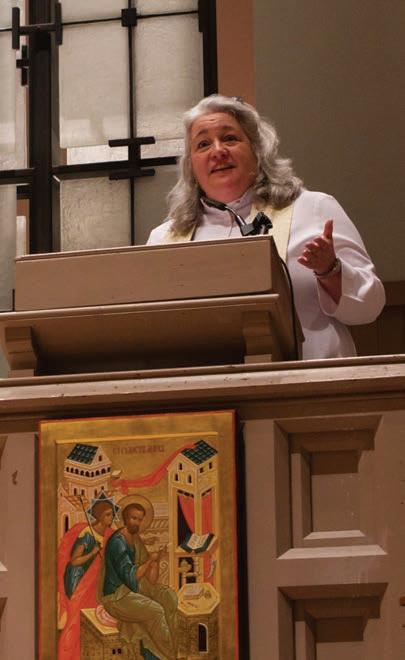
from the center of the earth in our own being and gives us the capacity to be truly present and strong, whatever the circumstances.1
Hope is not the product of our minds; it is not a weighing of pros and cons. If we need hope for justice work—and we do—then it is not born of logic, research, and strategy. Hope comes from establishing justice work as spiritual, contemplative practice. James Finley writes that,
Contemplative practice is any act, habitually entered into with your whole heart, as a way of awakening, deepening, and sustaining an experience of the inherent holiness of the present moment… The critical factor is not so much what the practice is in its externals as the extent to which the practice incarnates an utterly sincere stance of awakening and surrendering to the Godly nature of the present moment.2
How can it be that there is such suffering and injustice in the world and we still claim an inherent holiness of the present moment? It’s a paradox, a contradiction that is not solved with reason. It can only be held together in the context of faith. This is why justice work is contemplative, spiritual practice.
What is this practice like? First, we commit to cultivate the soul’s connection to the holy, so that we open space for that primordial force of hope to dwell and boil up in love, compassion, gratitude, and courage. Second, we
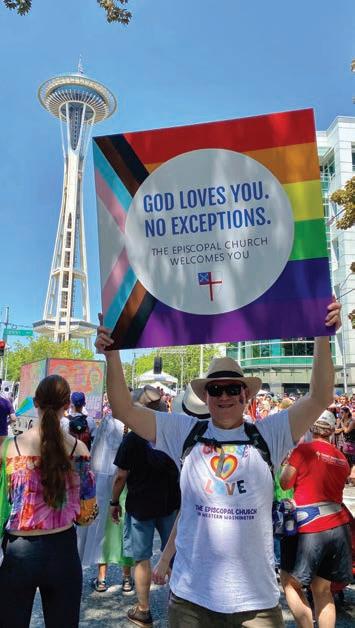

focus on the present and on relationships—to ourselves, to others, and to all of creation. We immerse ourselves in what is embodied and real now and let go of the desire to predict and control the future.
Third, we prioritize the offering rather than the outcome. So often, when we want to know what actions we should take, we try to assess the future impact and discount it back to today. Then we compare results and pick the one that has the highest “value.” But that is not about responding to the present reality; it is engaging an intellectual exercise. Instead, we need to ask, “What do I see today? What is needed today? How can I love today?” We follow that lead and set aside the need to know what the outcome is.
letter to the Romans, he writes, “Hope that is seen is not hope, for who hopes for what is seen? But if we hope for what we do not see, we wait for it with patience. The Spirit helps us in our weakness... interceding with sighs too deep for words.” (8:24–26). We can trust the divine Spirit as our source of primordial hope.
“WE ARE NOT ACCOUNTABLE FOR ‘CHANGING THE WORLD,’ BUT WE ARE ACCOUNTABLE FOR OUR FAITHFULNESS IN PRACTICE. THIS FAITHFUL, SPIRITUAL, PRACTICE OF JUSTICE ALLOWS FOR OUR OWN TRANSFORMATION THROUGH GOD’S MERCY AND GRACE.”
If justice work is spiritual work, there are some real implications for our ministry together. Foundationally, our deepest motivation for the work is a response to being loved by God and wanting to follow Jesus’ commandment to love others as we are loved. We also follow Jesus by remembering the many times he promised, “Do not fear, I am with you.” Fear is not of God. So, when our culture insists on fear and catastrophe, we must resist it and respond with gratitude and courage.
In addition, the heart of a ministry goal can’t be about changing others’ behavior. We need to remind ourselves of that often. The heart of our ministry must be awakening to and surrendering to God’s movement in the world today and aligning our energy with that. We are not accountable for “changing the world,” but we are accountable for our faithfulness in practice. This faithful, spiritual, practice of justice allows for our own transformation through God’s mercy and grace.
The First Letter of Peter to early Christian communities tells them to “always be ready to account for the hope that is in you” (3:15). This is an essential part of our justice work if we are to do it from a stance of faith. We must know how and why we hope. Our hope is not based on our passion, skills, resources, political power, or ability to problem-solve. It is based entirely on who God is, in the present, and Jesus’ vision of God’s kingdom. In Paul’s
In Reflections on the Unknowable, Fr. Thomas Keating writes:
To hope for something better in the future is not the theological virtue of hope. Theological hope is based on God alone, who is both infinitely merciful and infinitely powerful right now. Here is a formula to deepen and further the theological virtue of hope with its unbounded confidence in God. Let whatever is happening happen and go on happening. Welcome whatever it is. Let go into the present moment by surrendering to its content… The divine energies are rushing past us at every nanosecond of time. Why not reach out and catch them by continuing acts of self-surrender and trust in God? 3
Gathering all these thoughts together, this is what it might look like for justice work to be spiritual practice. We acknowledge the enormous reality of the problems of this world. We acknowledge our own limitations and fears. And we do the work anyway, centering on the needs and opportunities in the present moment. We don’t evaluate the worth of what we do today by measuring its future value. Its worth is how it aligns with God’s kingdom and its power to transform us. And we are always ready with a word of hope, knowing that nothing is impossible with God. What if our ministry is about naming, exploring, and modeling just this? ◆
1. Cynthia Bourgeault, Mystical Hope: Trusting in the Mercy of God (New York, NY: Cowley, 2001).
2. James Finley, The Contemplative Heart (Notre Dame, IN: Sorin Books, 2000).
3. Thomas Keating, Reflections on the Unknowable, (New York, NY: Lantern Books, 2014).
“The challenge of stewardship is to identify ‘what is in your hand’ and to amplify and utilize it to the greater glory of God.” These words encompass the work that Saint Mark’s Cathedral is doing in considering property for purpose, and they were shared in the Gift of Place conference, a national gathering hosted by Trinity Church Wall Street in November, at which Saint Mark’s presented.
In October 2023, Saint Mark’s was awarded a $100,000 grant from Trinity Church Wall Street’s Mission Real Estate Development initiative. Trhough this initiative, Trinity supports faith-based organizations to enhance their mission and ministry and meet the needs of the community while building sustainable financial capacity. “Our faith calls on us to use our gifts to help all people, advancing equity and justice in the here and now—and hopefully for generations to come,” said Beatriz de la Torre, Chief Philanthropy Officer at Trinity Church Wall Street. “We are grateful to be able to make these strategic investments in the work of grantee partners like Saint Mark’s, and applaud their vision to address the affordable housing crisis and have a direct impact on people’s lives.”
The grant from Trinity has significantly offset costs and supported work in

financial feasibility, geotechnical surveys, and environmental and historic building rehabilitation studies. One of the inspiring things about bringing people, property and partnerships together is the opportunity to catalyze values. For example, caring for and stewarding campus buildings and property to minimize carbon impact is a commitment Saint Mark’s takes seriously, and it is integrated into all aspects of community life. Through its affordable housing consultant, Saint Mark’s learned of the International Living Future Institute’s affordable housing cohort focused on sustainability, resiliency and equity in communities. Participation in this pilot aligns with Saint Mark’s carbon reduction goals and augments work to develop a sustainability roadmap for the project, including pursuing a Core Green Building Certification.

have been of great help to the committee as we move forward in our exploration.”
The Affordable Housing Exploratory (AHE) Committee has also engaged the parish by hosting two parish forums in September to provide an overview of the project opportunity and listen to questions, insights and values shared by parishioners. “Our committee was delighted with the widespread support of affordable housing that was expressed at the forums, with many saying that affordable housing would engage the cathedral’s vision, mission, and Mutual Ministry Goals, and that the setting and surroundings would be ideal for affordable housing,” said John Hoerster, Co-Chair of the AHE Committee. “There also were many thoughtful questions and excellent ideas that
Integral to the project is stewarding the opportunity of property as a tangible space and place of new mission and ministry. Key next steps toward realizing this vision include determining a design scheme that addresses geotechnical site conditions and aligns closely with the AHE Committee’s criteria for the project. This work will include assessing whether it would be feasible to adaptively rehab the historic building as part of redevelopment. In this next phase, Saint Mark’s has been invited to apply for an additional grant from Trinity Church Wall Street—up to $150,000—that will support completion of feasibility work and formulation of a recommendation to the Vestry on whether to proceed with redevelopment of the site for affordable housing.
“While any construction is still at least a few years away, it is exciting to consider how residents on the Cathedral campus will enrich North Capitol Hill in delightful ways,” said Dean Steve Thomason. “The prospect of this residential development furthers the vision for the Cathedral campus serving as a gathering place—an urban commons—for the neighborhood, for the cathedral parish and for those who may claim this place as home.” ◆
The Lambert House lgbtq+ Youth Center will be housed temporarily at Saint Mark’s Cathedral (in parts of Leffler House and the Carriage House) beginning in March 2024 and extending for one to two years. During that time, the brick foundation built in 1901 under Lambert House’s permanent home on top of Capitol Hill will be replaced in a seismic upgrade.
The mesh of missions between Saint Mark’s and Lambert House couldn’t be better. By housing Seattle’s lgbtq+ youth center, Saint Mark’s is continuing its long history of social justice action and inclusion on lgbtq+ issues. The former Lesbian & Gay Ministry at Saint Mark’s (a predecessor to the current Queer in Christ Ministry) had two weekly meal teams that provided dinners for lgbtq+ youth at Lambert House for years. The Lesbian & Gay Ministry at Saint Mark’s invited me to speak about lgbtq+ youth at Saint Mark’s three times over the years, once in Bloedel Hall, once in Thomsen Chapel, and once in Leffler House, where my office will soon be located, and where lgbtq+ youth will soon make friends and find community with each other.
I imagine that most of us reading The Rubric know that many lgbtq+ youth have suffered in their faith communities, or in their homes, due to prejudice communicated as God’s word. Millions of parents have rejected their lgbtq+ children because their pastors and their Christian teachings told them to. That still happens, even here in Seattle. Religion is, and always has been, the main justification that anti-gay parents cite when they kick their lgbtq+ child to the curb, forcing them into homelessness and survival sex. Some parents force their lgbtq+ child into torturous, cruel so-called conversion therapy programs that have never converted a single person but have severely harmed millions, usually unwilling minors. So it is especially important that the lgbtq+

youth at Lambert House, and their parents, see that a Christian faith community, Saint Mark’s Cathedral, embraces, houses, welcomes, and celebrates lgbtq+ youth. For those lgbtq+ youth who have suffered due to their parents’ religious beliefs, it can be uplifting to learn that there are Christian communities that accept them as fully human, no better and no worse than anyone else.
Lambert House is non-sectarian. We have youth participants whose parents adhere to every imaginable system of belief: Atheist, Mormon, Muslim, Jewish, Agnostic, Catholic, Evangelical, Eastern Orthodox, various Protestant denominations, Buddhist, Secular Humanist, and more. Lambert House creates spaces for lgbtq+ youth to be themselves, where they will not be discriminated against, excluded, excoriated, shunned, or belittled based on prejudice towards their sexual orientation or gender identity. It is also necessary that they not feel pressured into conforming to a particular belief system or doctrine, whether political, social, or religious, in order to fit in, or to be accepted at Lambert House. The missions of Saint Mark’s and Lambert House align in this profound acceptance. I look forward to multiple conversations with interested Lambert House youth, singly and in groups, about what it means to them to have their lgbtq+ youth center housed at Saint Mark’s, and how Saint Mark’s inclusion and social justice feel in action. ◆
Ken Shulman, MPA, is Executive Director of Lambert House lgbtq+ Youth Center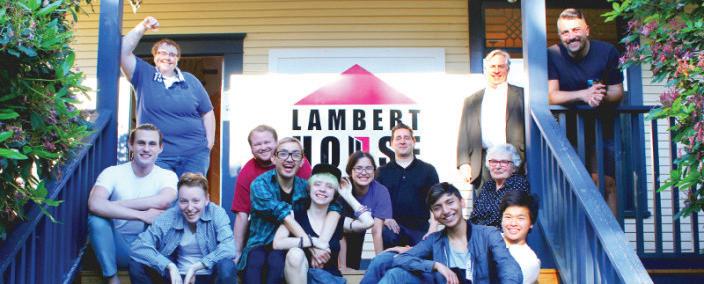



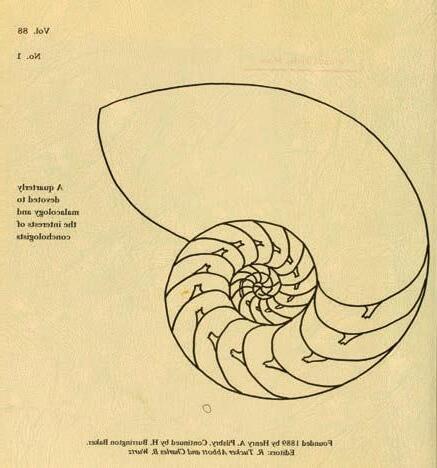




Faith formation is a journey, not a destination, and it’s one that is life-long. Conforming to Christ’s way of life takes inquiry and practice and asks us to be open to continual transformation. This spring, a new formation offering, Contours of the Christian Life, will provide an opportunity for all at Saint Mark’s, whether new or longtime parishioners, to focus on deepening faith, spiritual practices, and relationships in community.
The series arose from reimagining The Inquirers’ Class series. The Inquirers’ Class is now four weeks instead of six weeks and expands opportunities for engagement with a seminar approach. Many participants of The Inquirers’ Class series expressed interest in additional opportunities to go deeper into questions of faith and the practices of the Episcopal Church.
Over the course of six months in 2023, a group of clergy, staff and lay leaders spent time brainstorming and developing an additional offering. Contours draws inspiration from the Catechumenate, the ancient initiation process of the early church, to guide and nurture people wanting to go deeper into Christian practices as they respond to how God is moving in their midst. Together, we’re taking steps on the journey of following Jesus and discerning God’s call in our lives.
A series of weekly offerings during Lent will be held during the regular Wednesday evening “Cathedral Commons” time slot. All are welcome to attend, regardless of whether they are exploring Baptism or Confirmation. Participants in Contours will begin with an Enrollment Rite in February and continue the journey as a cohort, sharing in a community meal each week and accompanying each other through Holy Week. For many, the series will culminate at Cathedral Day (which in 2024 will fall on Saturday, April 27) with the laying on of hands by Bishop Skelton in rites of Confirmation, Reception into the Episcopal Church, or the Reaffirmation of Baptismal Vows.
The series is visually represented by the nautilus shell, which was chosen by a group of parishioners who were given the themes of the class and presented with different images in a survey. “The chambered nautilus shell is a graceful symbol for growth and renewal, and it is such a beautiful metaphor to consider the spiritual journey: order amidst chaos, always moving forward when needing space to grow,” said Dean Steve Thomason. “The nautilus shell’s geometric precision reflects something of the divine beauty and goodness that is seeded in all creation, including us.”
Each Wednesday evening session will be facilitated by clergy and staff. The series content is rooted in our baptismal identity in Christ. Baptism is more than a one-time event; it is an initiation and invitation into a life oriented toward God, where daily patterns are shaped by faith in practice and in action. The Book of Common Prayer says, “Baptism is a sacrament by which God adopts us as his children and makes us members of Christ’s Body, the Church, and inheritors of the kingdom of God” (p. 858). Whether participants are already baptized, seeking Baptism or Confirmation, or just wanting to learn more, living into our baptismal identity is a wonderful Lenten theme.
After completing The Inquirers’ Class last fall, where she learned some of the basics of reading scripture, and of the services and worship in the Episcopal Church, Theresa Barker says she has had a chance to learn and explore more on her own, but is longing to delve deeper into questions of faith in community—to question in collaboration with others who are finding their own way on this collective journey, and to consider how spiritual practices and worship align with her own spiritual beliefs. “Contours of the Christian Life is an invitation for me to enlarge and deepen my understanding and emotional experience with God’s word and God’s work in our world today,” said Barker.
Molly Bosch signed up because she is preparing to be received on Cathedral Day. “I have been prayerfully considering expanding my church family and perspectives on Christianity for many years,” said Bosch. “Taking The Inquirers’ Class this fall helped me to feel a sense of settled peace that God has called me to the right community as I discern big questions around my faith practice and how I wish to continue to serve in ministry. I am excited to dive deeper into the topics I was exposed to in The Inquirers’ Class and into my exploration of what it means to take my spirituality into new avenues through the community at Saint Mark’s.”
Some Contours participants have been attending Saint Mark’s for years and have expressed a desire to grow in their faith, revitalize connection, and cultivate new patterns of sacramental living. Others may choose to not formally enroll but engage as part of the weekly Cathedral Commons offering during Lent. Contours of the Christian Life is designed to be a space where this range of experiences and shared seeking brings mutual focus to go deeper into our questions, connections, and common life together. Come be part of creating something new as we seek to follow the risen Christ together. Learn more about Contours of the Christian Life at: saintmarks.org/contours ◆
Following a Rite of Enrollment on Sunday, February 11, participants of Contours of the Christian Life were encouraged to attend Ash Wednesday liturgy and to participate in Holy Week together.
Participants will move through inquiry and exploration as they commit to know the Gospel more deeply, participate in common prayer, celebrate the sacraments, and deepen faith formation with preparation and orientation to service.
Contours of the Christian Life will include seven Wednesdays with an opportunity to share a community meal and discuss these topics with clergy, staff and parishioners:
1. Listening for God’s Call in Scripture — A look at how we read and interpret God’s word.
2. Made in God’s Image — A look at how we each see God and how that shapes our beliefs and values.
3. Celebrate with Reverence (with an Instructed Eucharist) — In corporate worship we unite ourselves with others to acknowledge the holiness of God, to hear God’s Word, to offer prayer, and to celebrate the sacraments.
4. Episcopal Identity — What does it mean to be Episcopalian?
5. Saint Mark’s Identity — What does it mean to be a Cathedral and a Parish?
6. Body, Mind, Spirit — Exploring different expressions of prayer.
7. Doing Justice, Loving Mercy — How can we be truth-tellers and peacemakers in our community and in the world?

Scan the QR code to watch a special video invitation from Dean Steve Thomason, and find more information, including video of class meetings as they occur, at: saintmarks.org/contours
Saint Mark’s Mideast Focus Ministry (MEFM) and its predecessor, the Palestinian Concerns Group, have been advocating for peace and justice in the Middle East through educational programs to the cathedral, the greater Seattle community, and beyond, for over 40 years. Since 2000, the Episcopal Diocese of Olympia, through its Bishop’s Committee for Justice and Peace in the Holy Land has carried out a diocesan-wide ministry to support Palestinians in general and the Episcopal Diocese of Jerusalem in particular, through educational programs, clergy visitations and youth exchanges, pilgrimages and volunteers. The Bishop’s Committee also promotes the adoption of policy statements supporting peace and justice in Israel-Palestine in the Diocese and broader Church. Several members of MEFM also serve on the
Bishop’s Committee. Effective in 2024, with the support of ministry leaders and the cathedral Vestry, the two groups’ ministries will be combined through consolidation into the Bishop’s Committee.
Past MEFM programs of education for Americans seeking to learn about the complex history and current struggles in the Holy Land will continue under the auspices of the Bishop’s Committee, including (a) educational gatherings featuring internationally renowned speakers, (b) the annual Film Series presenting outstanding documentaries and interviews with film producers, (c) continuing efforts to encourage The Episcopal Church and other faith-based groups to better understand justice issues in the Holy Land and to advocate for non-violent solutions. The recent hostilities which
2024 marks the centenary of the birth of Peter Hallock (1924–2014), Saint Mark’s Cathedral’s beloved musician, composer, and liturgist. A bicoastal celebration launched with a concert at Saint Mark’s presented on February 24 & 25. (An on-demand video of this concert will be available soon.) The performances featured The Compline Choir directed by Jason Anderson, and the Byrd Ensemble directed by Markdavin Obenza, and countertenor José Luis Muñoz, presenting a program which set works by Hallock alongside Renaissance masters and contemporary compositions.
The celebration will continue in May on the East Coast with The Place of the Blest: Music of Hallock, Thompson, and Vaughan Williams, to be presented at St. Thomas
The Film Team of the Bishop’s Committee for Justice and Peace in the Holy Land is working on a film series for 2024. People already on the MEFM mailing list should watch for information about the series and stay connected.
Anyone wanting to learn more about the situation in the West Bank and Gaza should add themselves to the mailing list should by emailing: seattlemideastfocus@gmail.com
began October 7, 2023, in Israel and Gaza are likely to increase Americans’ interest in understanding these matters.
Those wishing to participate in the newly combined ministries of MEFM and the Bishop’s Committee will be directed to the Bishop’s Committee, which meets on the second Thursday of each month. ◆
Church Fifth Avenue in New York City on May 16, 2024. The Modus Operandi Orchestra will join the St. Thomas Choir of Men and Boys under the direction of Jeremy Filsell to present Peter Hallock’s To the Supreme Being and Michael, Archangel; the keystone of the concert will be Hallock’s sublime and rarely-performed A Brevity for baritone and orchestra, to a text by Thomas Merton. Learn more about this concert and purchase tickets at: https://bit.ly/prh-st5a
Throughout the year, the Hallock Institute is encouraging churches and community groups around the world to perform Peter Hallock’s compositions, and to register works they are performing at: hallockinstitute.org ◆
The Saint Mark’s Cathedral Choir plans to offer the following works by Peter Hallock in 2024:
The Baptism of Christ (Epiphany-tide)
Commit your way to the Lord (Lent)
Ye choirs of New Jerusalem (Easter Day)
The Phoenix (Ascension-tide)
There is a stream (All Saints-tide)
The O Antiphons (Advent)
Behold a mighty prophet (Advent)
Mark’s was awarded a $5,000 grant from the Diocese of Olympia’s Global Mission Program to support and further the Cathedral’s partnership with the Arab Evangelical Home and School in Ramallah, Palestine.
The grant helped fund a new ecofriendly heater for the facility, after the previous system stopped functioning in February 2023. The Arab Evangelical Home and School has
provided a safe haven for thousands of orphans, underprivileged children, and refugees since 1954. Programs currently include: a nursery school, after-school program, academic enrichment programs, summer camps, and a dormitory for volunteers and women in the workforce in Ramallah.
In July 2023, The Rev. Fadi Diab, priest at the school, visited Saint Mark’s with his wife Ruba and son. Fr. Fadi preached at morning services and spoke at a forum with Dean Thomason (pictured), where he shared about the lives of Palestinian Christians in the Holy Land. It was during this forum that Saint Mark’s learned of the children’s need for a new heating system. The grant from the diocese was supplemented by funds from the
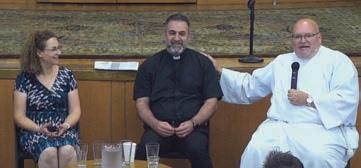
Dean’s Discretionary Fund. Following the outbreak of hostilities in Gaza and Israel in October, Fr. Fadi joined remotely from Ramallah for a follow-up forum, during which he thanked the community for its generosity.
Dean Steve Thomason said, “We are grateful for the opportunity to be able to support the mission and ministry of the Arab Evangelical Home for Children and look forward to continuing to deepen this partnership in ministry together.” ◆
How do you want to be remembered? Your values and what has been meaningful to you during your lifetime can best be expressed through giving to the institutions that matter to you. By thinking strategically and planning in advance, you can maximize your impact on those institutions and serve as a role model to your family, church, and others.
Planned giving is a way to offer thanks to God for the gifts and blessings given to you, affirm your values and the value you attach to your faith community, and keep Saint Mark’s Cathedral strong into the future by supporting its mission, ministries, and facilities. Types of planned giving include:
• Bequests in your will: the most common form of legacy gift. Specify a dollar amount, a piece of property, or a percentage or residual of your estate. Sample wording of a bequest provision can be found at saintmarks.org/planned-giving. Consult with a qualified attorney who can review your goals along with applicable federal and state laws to ensure that your will accurately reflects your specific wishes.
• Beneficiary designations: You can pass your assets directly to an individual or organization outside of probate, simply by designating them as a beneficiary. For example, you could name Saint Mark’s Cathedral or the Cathedral Foundation as a beneficiary of a life
insurance policy, pension, retirement fund, commercial annuity contract, bank account, or brokerage account. Talk with your attorney or financial planner about possible tax benefits from these arrangements.
Planned gifts to Saint Mark’s Cathedral are typically unrestricted donations in support of programs and ministries. Planned gifts to the Cathedral Foundation of the Diocese of Olympia are used exclusively for upkeep of and improvements to the cathedral’s buildings and grounds.
Whether you donate to Saint Mark’s Cathedral or the Cathedral Foundation, you will be continuing your stewardship of Saint Mark’s and helping assure the long-term financial health of the cathedral. You will become a member of the Cathedral Legacy Society (for Saint Mark’s Cathedral donors) and the Bishop’s Society (for people who include any Episcopal ministry in the Diocese of Olympia in their estate plans).
Want more information? E-mail giving@saintmarks.org or contact Erik Donner at edonner@saintmarks.org or 206.323.0300 ×217. ◆
Saint Mark’s Cathedral extends heartfelt thanks to all those listed below who gave a gift in support of the cathedral’s mission and ministries in 2023.
Anonymous (45)
Jon Achée
Hafidha Acuay
Jonathan Adams
Cynthia Ademujohn
Paul Adolphsen
Kali Aevermann
Allan
Maria Aguilar
Dawn Aiken
Stuart Ainsley
Seyi Akanni
Kevin
Paul
Austin
Mary
Kerry &
Nick
Paulina
Chap &
Rose
JoAn
Karen
Deborah
Patricia
Jason
Samara
Judy
The
Kristen
Luis
Heidi
LynnMarie
Joni
Ellen
Anne
Macile
Dan
The
Pam
Jenna
Paige
Ana
Jo
Ricardo Bautista
Jade & Morgan Bawcom-Randall
Mary Bayne
Kelly Beachell Gasner
Sam Beadel
Reid Beadel
Nancy Beadie & Don Argus
Molly Beall
James Bean
Erin & Casey Beary Andersen
Jim Beasley & Carla Becker
Jane Becker
Sarah Beer
Tim Beggs
Jonathan Beggs
Steve Bell
Betsy Bell
Curt & Barbara Bennett
Rachel Bennett
Steve & Trisha Berard
Clara Berg
Sarah Berg
Ben Bergo
Jean Berry
Jane E. Bertolin
Bourke & Miriam Betz
Berta Beveridge
Nancy Beyer Cannon
Charles & Kathryn Beymer
Atharva Bhat
Shel Bichindaritz
Steven Biczak
Michael & Carolyn Biggs
Glenn Billman
Hannah Binder
Johanna Bissat
Barbara Bizilia
Brit Bjurstrom Frazier
Simone Blanchard
Sarah Blenko
Gregory W. Bloch
Ann Blodgett
Kelly Blomster
Tina Blondino
Carolyn F. Blount
Gena Bomotti
Micah Boomer
Molly Bosch
John Bosma
Scott Bothel
Jen Boulware
Emily Bourcier
LaDonna S. Bowers
Dee Bowey
Andrew Bowyer
Janine Boyer
Philip Boyko
Colleen Boyns
Pamela G. Bradburn
Amy Bradley
Cherie & Hal Bradshaw
Dexter Bradshaw
Lara Bradshaw
The Rev. Charissa Bradstreet
Carmen & Matt Brady
Josh Brainard
Oliver & Adela Brancov
Parker Brand
Amelia Brandt
Nancy Brandt-Erichsen
Jessica Brat
Joanne Bratton
Bob Braun
Mary Anne Braund & Steve
Pellegrin
Julie Braybrooks & Greg Simon
Torie Brazitis & Ben Jones
Christopher Breunig
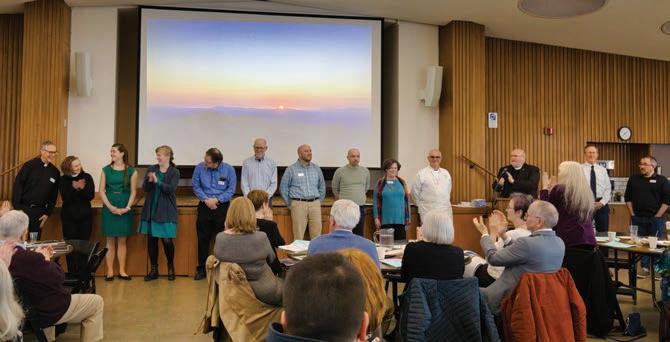
Jenna Brewington
Lou Bridges
Sarah Bridges
Jim Bromley & Joan Hsiao
Meghan Bronkema
Pamela Brooks
Laura Broustis
Deborah Brown
Carl & Mary Brown
Rachel Brown
Ashley Brown
Maria Brown
Patrick & Gayle Bryan
Jiho Bryson
Kelly Buck
Emma Buckland Young
Leah Buckley
Molly Bullard
Xander Bullock
Gavin Bullock
Laurie Burdick & Carolyn Woodward
Chris Buresh
Patricia Burke
Pamela Burke
Dianne Burr
Kysa Bursch
James R. Buskirk
Mel & Mary Butler
Dan Butler
Sarah C.
Christopher Cabrall
Bella Calabrese
Annie Calhoun
Ryan Calkins
Charles & Margie Calvert
Tom Campbell & Keith McCullough
Russell C. Campbell
Amelia Canaday
Jason Cancro
John Cannon
Sandra & Kent Carlson
Linda Carlson
Wendy J. Carpine
Libby Kelleher Carr
John Carroll
Amelia Carroll
Gerardine Carroll
Alan Carter
Jane & Dick Carter
Robert & Lauren Carter
Ginger Carter
The Rev. JP & The Rev. Barbara Carver
Zoe Carver
Andrew Casper
Connie Castaneda
Stephanie Castle
The Cathedral Foundation of the Diocese of Olympia
Kate Causey
Susannah Chace
Karen Ann Chalupnik
Constance & John Champion
Aarti Chandorkar
Arti Chandra
Be Chanlimcharoen
Fay L. Chapman
Robert Chapman
The Chen-Malloy Family
Sarah Childers & Bill Nordwall
Sarin Chin & Yon Van
Cynthia Chirot
Russell Chiupka
Susan Chloupek
Neil Chrisman & Carolyn Carlstrom
Ken Christensen
Andy Christensen
Mary Christenson
Justin Church
Church of the Holy Apostles
Usrah Claar-Peck & Bob Peck
Elizabeth Clark-Stern
Nancy Cleminshaw
Bruce Clifton
Lynne A. Cobb
Anna & David Coble
Kate Cochran
Scott Cochrane
Craig Cochrane
Rene Coig
Maria & Charles Coldwell
Cadence Cole
Celeste Colegrove
Freddie Coleman & Bryan Turner
Wendy Colton
Fran & Gerry Conley
Todd Connor
Karen Conover
David Conty
Gretchen Cook
Kevin Cook
Zalia Cook
Julia Cooper
Ian Corey-Boulet
Bob Corwin
Carl Cox
Martha Craig
Justin Craig
Roni Crass
Daniel Crews
The Rev. Stephen Crippen
Ray Crisologo
Alexandra Croft
Tracey Croisier
The Crosbie Family
Sallie & Mark Crotty
Christopher & Jilinda Crowley
Sharon Cumberland
Kai Curtis
Kelsey D.
Loy & Michael Dahl
David Dahl
Br. Paul & Mary Mac Dahlke
Laurie & William Daniel
Elizabeth Danz
Diana Danzberger & Jeff Bowers
The Rev. Jennifer & Will
Daugherty
Alan J. Davidson
James Davidson & John Gulhaugen
Russ Davies & Donna Martin
Carrie B. Davis
Amanda Davis
Lauren Davis
Greg Davis
The Rev. Canon Arienne S. Davison
Patricia A. de la Fuente
Clovis De Milo
Emily Dean
Allison Delong
Mark Denny
Vasco dePinna
Meghan &
Roberta Devine
Robin Dexter-Meyer
Puja Dhawan
Davina Diaz
Mary Dickinson
Alana Dickson
Margaret & Stan Diddams
The Diocese of Olympia
Jennifer Divine & Laureen France
Maria T. Do
Vinh Do
Danielle Dobrot
Jennifer Dobrovolny
Elaine Dondoyano
Jenny & Erik Donner
Harley & Christy Donner
Isabella Donovan Moran
Sturges Dorrance & Laurie Austin
Eleanor Dowson
Kayli Dragoo
Kennedy Dresh
Stefania Druga
Arielle D’Souza
Lyra D’Souza
Christine Dubois
Phyllis Duin
Isaiah Dummer
S. Wayne Duncan
Andy & Jillon Dupree
Jennifer Durrie
Susan & George Durrie
Angelika Dzema
Jennifer Eagle
Kate Earle
The Rev. Kae Eaton
Stephen Eddy
Julia Edward
Jan Eisenman
Kristine Ekman
Mary Ann & Richard Ekman
Paul Eldred
Kathleen Elkins
Marion A. Ellis
Liz & Stephen Ellmann
Karin Elsen
Tom Elwood
Sarah A. Elwood-Faustino
Michelle Emaelaf
Nancy & Edward Emerson
Brenda Emigh
The Rev. Rachel Endicott
Karen Eng
Peter Englund
Rebecca S. Engrav & Joon-Ho Yu
Christiane Enslow
Enterprise Community Partners
The Episcopal Church
Barbara & Steve Erickson
Sandie Erickson
Ralph Ermoian & Kristen Kelly
The Rev. Jack Erskine & The Rev.
Christy Close Erskine
Alison Leary Estep
Dan &
Robin Ethridge
Mike
Mary Evans
Anita Evans
Mo Fain
Dana
Sarah
Alisa Furoyama
Gaurav Gada
Diana Gale
Jim Gale & Virginia McDermott
Emily Gallop
Catherine Gannon
Juan Gardner
Amy Gardner
Lulu Gargiulo & David Wild
The Rev. Steve Garratt & Margaret
Michael Garrett
Scott & Jennifer Gary
Heather Gasvoda
Emily Gatch
Elle Gaubatz
Aurora Gault
Neil & Sonjia Gavin
Svetlana Gedymin
Guy & Pam Generaux
Nancy J. George
Bruno George
Bill & Roxy Giddings
John Gilbert
& Liz Gilbert
Rebekah Gilmore & Tyler Morse
Erin Gilmore
Katherine Gilmore
Michael Girardi
Ryan & Katrin Gist
The Rev. Chelsea Globe
Vicki Glover
Jillian & Jon Goddard
Aaron Goen
Alicia Goodwin
Cynthia Goodwin
Anna Gordon & Pete Kangas
Marsha Goss
Rob & Shannon Gould
Beatrice Gould
Mark M. Graham & Allan C. Sy
Dr. Grace Grant & The Rev. Dr. Dennis Tierney
Tom & June Grant
Anita Gras Bryant & Tom Kress
The Rev. Lisa Graumlich
David Gravelle
Miss Tajarii Gray & Mr. Austin Wright
Sydney Grayson
Erika & Blake Grayson
Carol Green
Vicky Greenbaum
Betsy Greenman
Ann Gregg
Collin Grenfell
Allie Gretch
The Rev. Gen & Gary Grewell
Io Grey
Gerrie Gribble
Joel & Rachel Gronsky
Melina Gross
Kathleen & Adam Grossman
The Rev. Earl Grout
Lucy Gubbins & Mo Mukhtar
Kay Gullberg
Sarah Jane Gunter
Mary Ann Gwinn & Steve
Dunnington
Phillip & Eda Lee Haas
Craig Haberman
Joie Hackney
Peg Haggerty
Isabel Haggerty
Kacey Hahn
Leah Hair
Kate Elizabeth Halamay
Estate of Bernard & Jean M. Haldane
Becky & Paul Haley
Edie Hall
Susan Hall
David Hallowell
Merica Halstrom & Kevin Friedrich
Darlene Halverson
Greg Hamm & Beatrix RoemheldHamm
Ben Hamm
Finn Hammen
The Rev. Blaine Hammond & Elizabeth Forbes
Lisa Hammond
My Hao Dang
Van Hardison & Thomas Bradford
Elizabeth Hardisty
Tim & Cyndi Hargrove
Kim & John Harlow
David Harms
Norm & Tovi Harris
Evan & Heather Harris
Connor Harrison
Sarah Harrison
Ryleigh Hartung
Brenda Harwood
Khan Hasan
Amie Haskett
Donna Haugan
Katrina Hawking
Robert E. Hayden
Micah Hayes
Marian Hayes
The Rev. Bob & Sally Hayman
The Rev. Kendall Haynes
Tom & Margie Hayton
Rose Hazard
Ashley Hedeen
Betsy Heimburger
Edward & Mary Henderson
Skye & Jim Henley
Tonya Henninger & Sarah Bork
Michelle Henry
Audrey Herbert
Sam Herring & Lynn Noordam
Newby Herrod
Kelsey Herschberger
Kay Hessemer & Jay Hunter Cook
Jay & Judy Hiester
Hayden Higgins
Krista Hildebrand
Pablo & Maricel Hinkulow
Cameron Hissey
Suzanne Hittman
Jeremy & Michelle Hobbs
Hannah Hochkeppel
Richard & Heather Hodsdon
Marie Hoeger
Cory Hoeppner
Carol & John Hoerster
The Rev. Paul & Donna Hoffman
Kay Hofmeester
Melissa Hogan
H. Lee Holcomb
Nan Holcomb
Ann Holiday
Andrew & Keri Hollenbeck
Jim Hollingworth
Ann Holmes Redding
Paul & Marcia Holt
Pat Honeysuckle
Daniel & Leslie Hopkins
Paul Hopp
William W. Hoppin
Kim Hoppner
Gwen A. Horne
The Rev. Josh & Christy Hosler

Kirk Hovenkotter
Elli Howard
Cheryl Howard
Sean Howard
Nathan Howden
Alex Hoy
Bethany Hoy Adrienne Hubbard
Ellie Huff
Becky Hughes
Roy L. Hughes
Andy & Tracy Hughes
Alex Hughes
Roderick Scott Hulet
Katharine Humphreys
John & Elena Hunt
Wesley Hunter
Hanna Hupp
William C. Hurt III
Emma Hutcheson
Kit Hymel
Melody Ikemura
Ann & Jon Ilgen & family
Elea Ingman
Jen & Ryan Inman
Mark & Alison Ippolito
Yvette Iribe
Thomas Iurino & Elizabeth Lunney
Betsy Ivey
Marina Ivy-Mars
June Jackson
Karen Jackson
Grace Jacobs
Pamela Jacobson
Satya Jaech
Maria Jampolsky
Kayla Jane
Pat & Don Janssen
Madi Jeffries
Robert C. Jenkins
David A. Jenkins
Ben Jenson & Connie Hansen
Mildred Jesse
Susan Jeter-Koch
Gerry Johnson & Linda Larson
Kay Johnson & Joe Zunt
Kevin C. Johnson
Lynn Johnson
Cynthia Johnson-Garnett
The Rev. Canon Elise Johnstone
Susan Delanty Jones
Laurie Jones
Addison Josey
Josh & Caroline Judd-Herzfeldt
Carol Judge & Richard Wyckoff
Eunice Jun
John Jung
Jake K.
Rebecca Kacel
Betty Kahle
Daisie Kallop
Taryn Kane Aimee Kanemori
Lauren Kang
Roberta F. Kanive
Gail Kappel
Ryan Karnoski
Naomi & Masashi Kato
Fran Kato
Charlotte Kayne-Amoureux
Page Kelley
Amber Kemmerling
Lesley Kennedy
Jeff & Judy Kenyon
Terry W. Ketcham
Franny Ketcham
Janet Wright Ketcham
The Rev. Hillary Kimsey
Charles Kincy & Phoebe Kitanidis
Louise L. Kind
Erik & Christine Kindem
Kara J. King
Brad King
Trenton Kirchberg
Genevieve Kirsch
Kelsey Klausmeyer
Michael Kleinschmidt & Marc
Aubertin
Amy Klosterman
Melinda F. Kmitta
Re Knack & Brian Cole
Tiffany Knapp
Melissa Knapp
Thomas Kneale
Susan Knirk
Olivia Knudson
Mary Koch
Dan & Jaf Koch
Vinnu Komanapalli
Karen A. Komoto
Aleta Konkol
Karla L. Koon
Collin Kosiba
Scott Kovacs
Paul Kramer
Amity Kramer
Miranda Krause
Susan Kreml
Kathy Krikorian
Bryan Krislock
Bruce Krogman
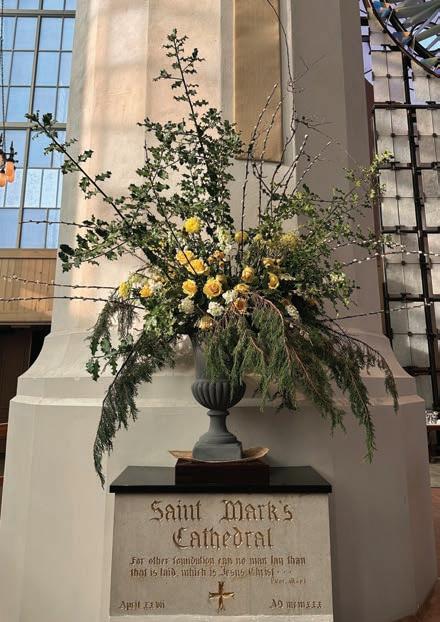
Susan Kromholtz
Mark Kuiper & Kristen Austin
Karl & Catherine Kunkel
Ashley Kusch
Glenn Kuz
Kathy Lachata-Oakley
Leo Lai
Hailey & Dan Nielubowicz
Katharine Lamperti
Susanna & James Lane
Kip & Sheila Lange
Katherine Langsdorf
Dale Largent
Andrea Largent
Erica Largent
Barbara A. Larson
Kayla Laughlin
Eric Lawrence
Kaitlan Lawrence & Andrew Jang
Edith Lawrence
Chevy Lazenby
Thai Hoa Le
Leary Family Trust
Edmon Lee
Michael Lee
Linda Lee
Brooks Leffler
Matthew Leggett
Martha Leigh & Joe Brady
David & Linda Leisy
Virginia & Brian Lenker
Amy Leonard
Sarah Leonard
Austin J.O. LeSure & Jessica K.
Carlson
K.O. & Melanie LeSure
Zoe Levin
Abigail Levin
Patricia Lewis
Don & Carla Lewis
Howard & Teresa Lewis
David Lewis & Susie White Lewis
Clayton Lewis & Dragana
Kovijanic
Bill Lewis
Marissa Lewis-Ryder
Jessica Li
Cindy Liddle
The Rev. Phillip Lienau & Jeremy
Richard Marchand
Karen Marcusen
Leila Mardoum
Theresa Marinelli
Martha Marino
Lynne S. Markova
Sofia Marrache
Elizabeth Marriett
Alicia Marsh
Heidi Marsh
The Rev. David Marshall
Lori Martell
Susan Martin
Keiko Maruyama & Jaime Rubio
Sulficio
Darrin & Shaula Massena
Martha Maurer
Mary C. Maxon
Linnea May
Arnie & Kathy Mayer
Curry Mayer
Michael & Rosemary Mayo
Breanna McArdle
Stanley & Janet McCammon
Joseph & Pamela McCarthy
Sarah McCord
Tyler McCormick & Rachel Heath
Jill & Philip McCune
Mark McDonald
Pearl McElheran
Stephanie McEwen
Crawford
Ting-Chun Lin
Georgia Lindquist & Peter Aberg
Elinor O. Lindquist
Abby Lindsay
Lex Lindsey & Lynn Manley
Jane Lindsey
Bev Linkletter
Clara Liu
Page Loeb
Julia Logan
Andre Loh & Selina Chow
Susan Longfellow
Mary Lonien
Robert Losey & Beverley Brown
Losey
Aaron & Carole Loudenback
Trevor Lovell
Margaret M. Lucas
Amity Ludders
Barbara Lui
Del Lui
Carol Lumb
Renee Lund
Rebecca Lund
Mark & Kelly Lundquist
Kelly Luo
Noele Lusano
Marge Lutzvick & Jane Gelnett
Melyssa Lyons
Mary Lou Macala
David MacBride
Phyllis MacCameron
Carleton
Mary
Ryan
Scott &
Jim
Greg
El McFarland
Dorian McGlannan
Pat & Joe McGuire
Megan McGuire
Annie McHugh
Heidi McIlroy
Brandy McKinney
John McLaughlin
The Rev. Malcolm & Hannah
McLaurin
Dilcia McLenan Brent
Sonia McLeod
Tim McMichael
John & Kim McNamara
Donna McNamara
Oscar McNary
Michael McNutt
Kinnon McPeak
Ruth McRee Schultz
Bill & Colleen Meacham
Margaret Means Morency
Sonia Mededovic
Emily & Stuart Meeks
Breona Mendoza
Paul Brekke Menth
Dave Menz
Jessica Mercer
Kitty Merrifield
Paxtyn Merten
The Rev. Gretchen Mertes
Pearl Mess
Brad Messer
Elizabeth Metcalf
Suzanne Metzmeier
Zach Meves
Mollie Meyer
Ben Meyerdirk
Rosa Michaelis
Emily Michalik
A. Middlecamp
Ron Milam
Marilyn Milberger
Heather Millar
Stu Miller
Linda Miller
Ray Miller
Jacquelyn & Gordon Miller
Leslie R. Miller
Vincent & Marsha Miller
Joan Miller
Martha Miller
Kate Miller
Jake Miller
Janet Miller
Justin & Nicolette Mills
Jane Mills
Kathy Minsch
Sierra Minton
Gary & Ginger Minugh
Paul & Emily Misleh
Sue Mitchell
Steve Paul Moen
Fran Moen
Jody Molina
Roberta & Teofilo Mondares
Julie Montgomery
Jacob & Kelly Moody
Alison Moon
Keith & Dorothy Moore
Rachel Moore
Racquelle Moore
Jeanette Moore
Austin Moreman
Victor Rova Morgan
Tennyson Morin
Alex Morrison
Michael & Judy Morrison
Sandy Moss
Michael Mostov
Laura Ellen & Bob Muglia
Travis & Rebecca Muld
The Rev. Meghan Mullarkey
Mary Mullen
Claire Muller
Ruth Mulligan
Nancy Mullins
Salvador Mungia
Mr. Michael Murphree
William Murray
Alice Myerhoff
Saksham Nagar
Jason Naki & Robert Boehlke
Chandrakana Nandi
John C. Narver
Colin & Anahi Narver
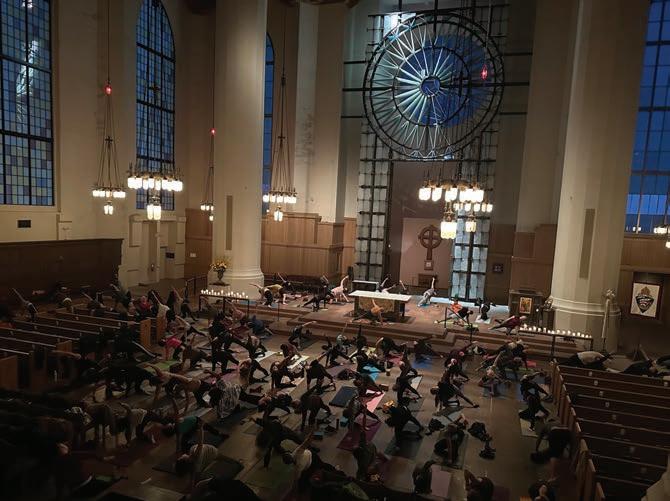
1245

the wisdom school at saint mark ’ s presents
saturday, may 4, 9:30 a.m.–12:30 p.m., in bloedel hall and via zoom. registration required. Author of Sober Spirituality, spiritual director and life coach, the Rev. Erin Jean Warde will guide this day retreat exploring spiritual healing in mind, body, and soul. She offers: “Together we will learn how community, creativity, rest, and joy can care for us when we are struggling, whether that’s with mental health challenges, the inevitabilities of being alive, or with habits that don’t serve us.” The day will explore barriers to feeling joy and fulfillment and how to make small, accessible life changes to care for ourselves, even in overwhelming times.

Fee for the Saturday Workshop: $15 (for both online and in-person participants). Partial scholarships available. Find the registration link at: saintmarks.org/wisdom
NOTE: Rev. Warde will also preach at Saint Mark’s on Sunday, May 5, at the 9 and 11 a.m. Eucharists, and lead a discussion for 20s/30s in Diocesan House at 5:30 p.m. on Sunday evening (registration required).